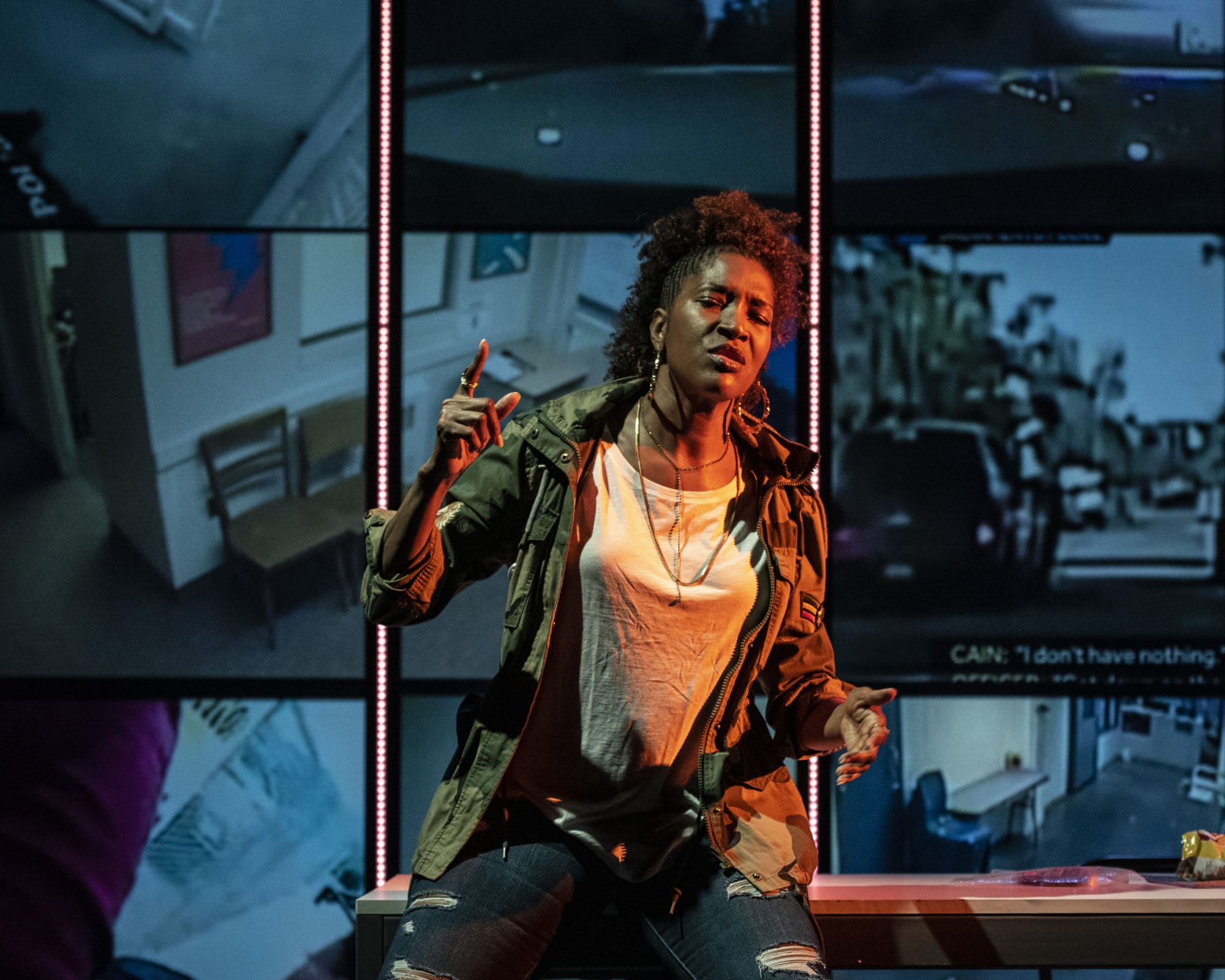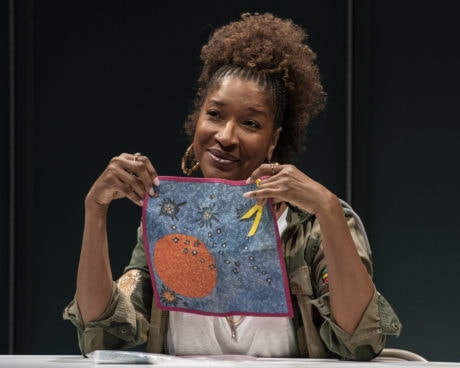A klaxon sounds. A video montage of “Betsy” LaQuanda Ross (actor and playwright Liza Jessie Peterson) passing through the visitor entrance at a correctional facility plays in black and white on the wall that extends from stage right to stage left. We are treated to objectifying closeups — is she smuggling contraband in her mouth? In her jeans? Under her shirt? In her bra?

Finally, LaQuanda takes her seat at a long institutional table, front and center, facing the audience (Scenic & Lighting Designer Andrew Cissna has opted for a bare set). LaQuanda is visiting her best friend Jojo, a talented hairstylist from Brooklyn sent to one of the many correctional facilities that dot upstate New York’s rural landscape for a non-violent drug offense. Jojo has a husband and three children back at home.
Over the course of several visits with Jojo, we learn of LaQuanda’s “peculiar patriotism” providing the friends, family, and lovers she sees as POWs in the so-called “War on Drugs” with loving human connection as she zig-zags across the Empire State on overnight buses from New York City. Jojo never gets a word in: the audience sits in her place. It is not surprising that Peterson and her collaborators have brought her show to audiences in prisons and jails whose inmates would be able to empathize with Jojo’s situation.
LaQuanda, inspired by the guidance counselor who took her under her wing when she was in juvenile detention and who taught her the art form, unveils to Jojo the latest square of the quilt she’s currently working on, with each square representing one of the POWODs (as LaQuanda calls them) she visits. Jojo is represented by an orange full moon with three shooting stars. LaQuanda notes that quilts were used by both slaves and abolitionists during the time of the underground railroad to send coded messages. It is not the only parallel she sees with slavery in the antebellum South and today’s prison-industrial complex.
While the Thirteenth Amendment forbade the previously peculiar institution of slavery, it still allowed for forced labor as a condition of punishment (or rehabilitation, depending on how one wishes to define things) for a criminal offense. As Peterson elucidates as she takes on the role of Pablo, the more erudite of LaQuanda’s two suitors, not only is labor part of life in prison, but it fits into a larger political economy. Increasingly, prisons are privatized — state functions are taken over by for-profit companies that contract with the state. Prison labor is less about maintaining the prison’s internal functions and more about providing cheap labor for contractors and providing dividends for shareholders.
But this economic reorganization also reenforces slavery’s legacy — even in a northern state like New York. Ever since the War on Drugs was declared in the 1980s, enforcement has focused on urban communities where black and brown users and traffickers are concentrated, and ignored suburban and rural communities where white users and traffickers live and ply their trade. Sentences are harsher for crack cocaine than for the powdered cocaine favored by white users; politicians who are reflexively law-and-order candidates suddenly speak compassionately when the topic turns to the opioid crisis in largely white suburban and rural America.
With this racial and geographic disproportionality in arrests, penalties, sentencing, and imprisonment, it is not just that black and brown communities are suffering in terms of incarceration. There is a transfer of wealth, not just to the for-profit prison industry but from urban to rural areas — the prisons are built in largely rural towns that once were home to industries that collapsed decades ago. It’s the locals who are employed as correctional officers and support staff by the local contractors, and the local businesses like the diners and convenience stores that cater to the busloads of friends, family, and lovers, who, like LaQuanda, make their regular visits. The prison population counts toward the local census, so municipalities that host prisons receive increased federal funding.

Peterson and her collaborator, Director Talvin Wilks, may wish to educate their audience about the structural racism of the American penal system, but Peterson has chosen to do so not as a lecture or a documentary, but through its effects on LaQuanda. Her backstory includes a father who was with the Black Panther Party and was killed in prison when she was nine years old, and in her present, her heart is split between Curtis, an ex sent back to prison on a parole violation (she carries his letters in the same bag as her quilt squares), and Pablo, her new love on the outside. Peterson’s LaQuanda is ever ready with an anecdote about the old neighborhood, a heart-to-heart about friendship, affectionate teasing, bawdy humor, brief history lessons, and the news about friends and relations in other prisons — most tragically, Larry, a young man with a college scholarship who filmed an incident of police violence only to be sent to prison after evidence was planted on him.
Katherine Freer’s Projection Design effectively adds to the story, with the mundanely recurring video of LaQuanda’s body searches, her rides back home, but also documentary montages of the War on Drugs, a travelogue of New York State’s correctional facilities, and during a rap interlude, a red, white, black and blue animation featuring stars, stripes, and barbed wire.
Costume Designer Latoya Murray-Berry has dressed LaQuanda in an outfit that looks practical for the long bus rides to upstate New York’s prison towns, but doesn’t betray her political commitments to black nationalism, with various patches and insignia sewn onto her camouflage jacket.
It’s easy to look at statistics and become exasperated that the nation’s drug policies and penal systems exhibit a structural racial bias that runs so deep that it seems as if no one individual, even well-placed and with the best of intentions, can fix it, but it may take art like The Peculiar Patriot to portray its impact on the millions of LaQuanda Rosses who simply love someone convicted of a crime.
Running Time: 90 minutes, without intermission.
The Peculiar Patriot, presented in association with National Black Theatre and Hi-Arts, plays through April 20, 2019, at Woolly Mammoth Theatre Company, 641 D Street NW, Washington, DC. Purchase tickets at the venue or order online.
Composer & Sound Designer: Luqman Brown; Production Stage Manager: John Keith Hall.




